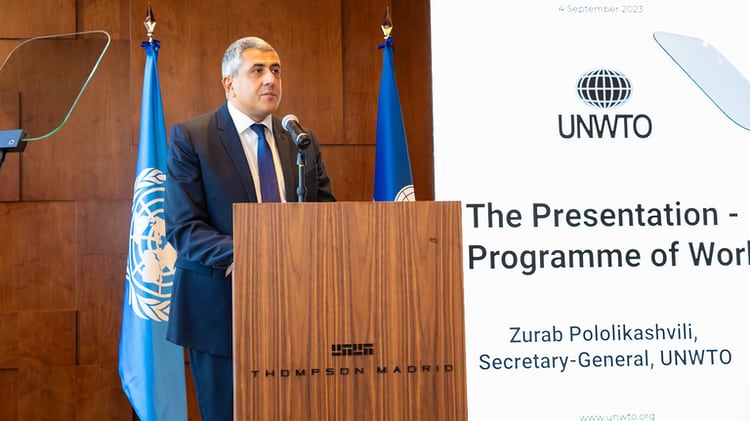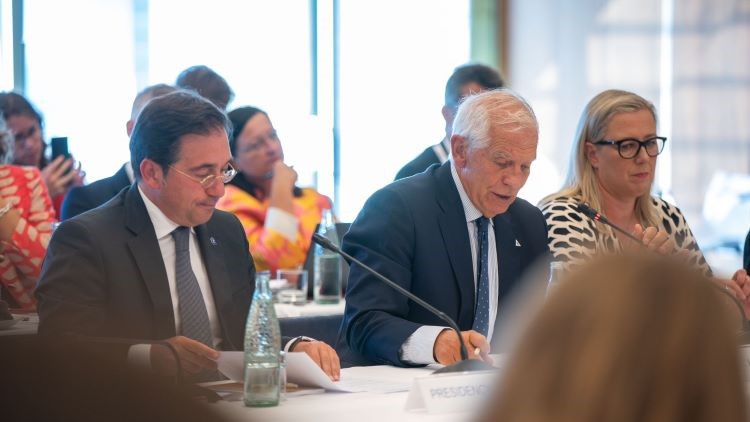Alberto Rubio
Digital innovation, investment in human capital, business investment, sustainable transition and competitiveness are the five pillars on which the Secretary-General of the World Tourism Organization (UNWTO), Zurab Pololikashvili, wants to continue driving the recovery of tourism in the world, which has already exceeded 85% of pre-pandemic levels in Europe, Africa and America.
He made this clear to the ambassadors accredited to the organisation in Madrid during the presentation of the UNWTO’s work programme, which is already underway. In his speech, Pololikashvili reviewed the work carried out by the organisation since he was first elected Secretary-General five years ago. Among other initiatives, he highlighted the ‘Best Tourist Villages’ programme, whose aim has been and is, he said, “to recognise villages with a real commitment to sustainability, using tourism as an engine for development, preserving natural and cultural assets”.
Pololikashvili said the creation of the Innovation, Education and Investment Department “has attracted 18,000 applications from 150 countries, raising several million dollars” for the startup competitions. He also said he was “proud to have awarded 10,000 scholarships for the courses we offer with IE University through our Online Tourism Academy“, one of UNWTO’s “special educational tools”, which has so far welcomed 22,000 students from 150 countries.
He also highlighted the launch of the Degree in International Sustainable Tourism, “which will be taught in collaboration with the Lucerne University of Applied Sciences and Arts”, and the launch of the UNWTO-Kingdom of Saudi Arabia Human Capital Development by E-Learning project.

Pololikashvili made special mention of the importance of encouraging investment in the tourism sector. To this end, UNWTO has organised five investment forums, more than 30 training events and developed 12 sets of guidelines “to connect investors with opportunities in destinations”.
On the other hand, he pointed out that “since the beginning of my mandate, UNWTO has oriented tourism towards a more sustainable future“. In this regard, he listed the Glasgow Declaration, which already has 800 signatories committed to achieving zero net emissions by 2050; the ‘One Planet’ Sustainable Tourism Programme, which seeks to reduce consumption and waste by 2030; and the Measuring Sustainability in Tourism project, which aims to support respect for the environment in the sector.
On the institutional front, the UNWTO Secretary-General was pleased that “Spanish Government has announced that our new headquarters will be ready in early 2025″, once the remodelling work on the Palacio de Congresos located on Madrid’s Paseo de la Castellana has been completed. “Madrid is the capital of world tourism,” he said.
He also expressed his satisfaction at the opening of the organisation’s regional offices in Nara (Japan) and Riyadh (Saudi Arabia), where World Tourism Day will also be celebrated on 27 September. He also announced “progress” in plans to open new offices in Brazil and Morocco, and in talks to “boost our presence on the ground in Argentina, China, India and Uzbekistan“, where the next UNWTO General Assembly will be held from 16 to 20 October.
Finally, Pololikashvili described as a “legal milestone” the International Code for the Protection of Tourists, to which “15 countries have already adhered and are working to convert it into national law, in addition to 17 others that have expressed their interest” in doing so. In this regard, he announced that at the end of November the first UNWTO International Conference on Tourism Law will be held in Salamanca “to continue to make progress on this historic initiative”. And he confirmed his determination “to put tourism on the agenda when the world’s largest economies meet at the G20 and G7″.







